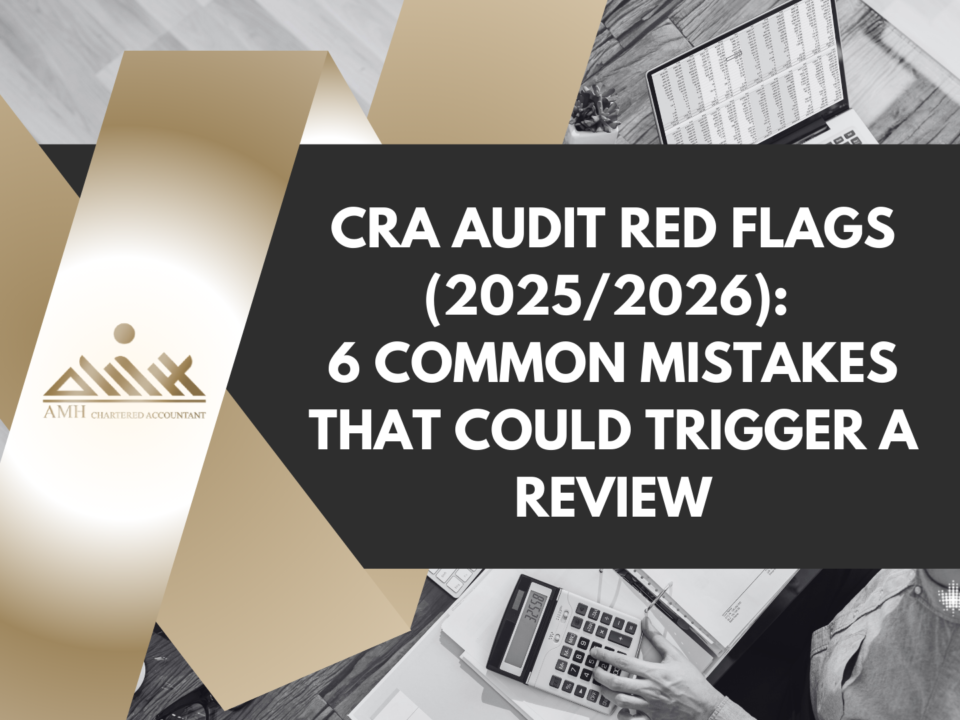
How to Accurately Track Project Costs in Service-Based Companies
June 20, 2025
How to Prepare Monthly Financial Reports for Executives and Investors
June 30, 20259 Internal Audit Tips to Reduce Financial Risk in Your Corporation
Reducing financial risk is a top priority for any business, and internal audits are a vital tool in achieving this. Here are 9 essential tips for conducting effective internal audits that safeguard your corporation’s financial health, brought to you by AMH Chartered Professional Accountant.
Introduction: The Importance of Internal Audits
Financial risks are a part of every business, but the way a company handles and mitigates these risks determines its long-term stability and success. Internal audits play a crucial role in identifying potential risks, improving internal controls, and ensuring the accuracy of financial reporting. At AMH Chartered Professional Accountant, we specialize in guiding businesses in Toronto and the GTA, including Milton, Oakville, Hamilton, Kitchener, and Waterloo, through the process of setting up and maintaining effective internal audit systems.
In this article, we explore the best internal audit tips that help corporations reduce financial risk and enhance operational efficiency. These tips will not only help you safeguard your assets but also build a more transparent and accountable financial system.
What Is an Internal Audit and Why It Matters
An internal audit is an independent review and assessment of a company’s financial systems, internal controls, and processes. The primary goal of an internal audit is to identify weaknesses in the company’s operations, financial systems, or compliance procedures that could lead to financial loss, fraud, or mismanagement.
Why it matters:
Mitigates Risks: It identifies vulnerabilities in business processes, making it easier to address potential financial risks.
Ensures Compliance: Ensures that your company complies with regulatory standards and internal policies.
Improves Efficiency: Identifying inefficiencies helps streamline operations and improve overall profitability.
Internal audits help to maintain financial integrity, transparency, and compliance, which ultimately strengthens a corporation’s overall health.
How Internal Audits Help Reduce Financial Risk
Effective internal audits reduce financial risk in the following ways:
Identifying Fraud and Mismanagement: Audits help detect fraud, theft, and mismanagement early.
Ensuring Accurate Financial Reporting: Internal audits confirm that financial statements accurately reflect the company’s financial position.
Strengthening Controls: They help strengthen internal controls, reducing the risk of errors and fraudulent activities.
Improving Efficiency: Identifying inefficiencies leads to cost savings and better resource allocation.
A well-structured internal audit system can protect a corporation from costly risks and support its growth and sustainability.
9 Essential Internal Audit Tips to Protect Your Corporation
Implementing effective internal audits requires a structured approach. Here are 9 internal audit tips that can help your corporation minimize financial risks and strengthen internal controls:
Tip 1: Implement Regular and Comprehensive Audits
Regular audits provide ongoing insights into the financial health of your business. They help detect discrepancies early, minimize the potential for financial misstatements, and ensure compliance with financial regulations.
Annual Audits: Annual audits are necessary to keep a close watch on financial health.
Quarterly Reviews: Conduct quarterly reviews of financial statements to ensure that everything aligns with company policy and regulatory requirements.
Spot Checks: In addition to regular audits, random spot checks can help identify issues that may not be apparent in scheduled reviews.
AMH Chartered Professional Accountant can guide you in setting up an audit schedule that fits your business needs.
Tip 2: Involve the Right People in the Audit Process
Internal audits should involve a team of skilled professionals who understand both the operations of the business and financial reporting standards.
Internal Audit Team: Include employees who are well-versed in financial processes, internal controls, and the company’s operations.
External Auditors: Sometimes, it’s beneficial to have external auditors conduct the audit to ensure impartiality and objectivity.
At AMH, we provide expert auditing services to assist your team in managing audits, providing external perspectives when necessary.
Tip 3: Maintain a Strong Internal Control System
A robust internal control system is the foundation of a successful internal audit. Effective internal controls prevent fraud, minimize errors, and ensure compliance with regulations.
Document Procedures: Ensure that standard operating procedures (SOPs) are clearly documented and followed.
Access Controls: Limit access to sensitive financial data to authorized personnel only.
Separation of Duties: Ensure that different people are responsible for key tasks like transaction approvals, data entry, and reconciliations.
AMH can help you design and implement an internal control system that mitigates financial risks and improves operational efficiency.
Tip 4: Regularly Review Financial Statements
It’s essential to review your financial statements regularly to identify potential discrepancies or issues early.
Balance Sheet Review: Regularly review your balance sheet to ensure accuracy in assets, liabilities, and equity.
Income Statement: Closely monitor your income statement for trends in revenue, expenses, and profit margins.
Cash Flow Statements: Ensure you have adequate liquidity to cover operational costs.
AMH Chartered Professional Accountant offers expert services in reviewing and interpreting your financial statements to ensure accuracy and compliance.
Tip 5: Perform Segregation of Duties
The principle of segregation of duties ensures that no one individual has control over all aspects of a financial transaction. This reduces the opportunity for fraud and errors.
Example: The person who approves a payment should not be the same person who processes the payment.
Rotation of Duties: Regularly rotate duties among employees to reduce the risk of collusion.
By separating key responsibilities, you reduce the risk of fraudulent activities and enhance the integrity of your financial processes.
Tip 6: Embrace Technology in the Audit Process
Technology can streamline the internal audit process and enhance accuracy. Implementing the right tools can significantly reduce the risk of human error.
Automated Audit Tools: Use software to automate the process of data collection, financial reporting, and transaction analysis.
Real-Time Data Analysis: Tools like QuickBooks Online, Xero, and Zoho Books provide real-time access to financial data and reporting.
Cloud-Based Solutions: Cloud-based tools offer easy access, backup, and security for financial records.
AMH can guide you in integrating the right technology to optimize your internal audit system.
Tip 7: Monitor Cash Flow and Expenditures Closely
Cash flow management is critical to reducing financial risk. Effective cash flow monitoring helps you ensure that your business has enough liquidity to cover its liabilities.
Monitor Receivables and Payables: Keep track of outstanding customer invoices and vendor payments to avoid cash flow issues.
Track Unpaid Bills: Ensure you follow up on overdue payments promptly.
Forecast Cash Flow: Regularly forecast your future cash flows to anticipate shortfalls.
Tip 8: Ensure Compliance with Legal and Regulatory Standards
Compliance with tax laws, industry regulations, and internal policies is vital in reducing financial risk. Auditors must ensure that financial statements meet the required legal and regulatory standards.
Regular Compliance Checks: Ensure that your company is following all regulatory requirements in your industry.
Tax Compliance: Regularly review tax filings to ensure accuracy and compliance with the CRA.
Updates on Laws and Standards: Stay informed about changes in tax laws and industry regulations.
AMH offers expert advice to ensure your company’s operations remain compliant with all relevant standards.
Tip 9: Continuous Improvement and Training
An effective internal audit system is not static; it should evolve as the business grows and as new risks emerge. Continuous improvement through training is key to a successful audit process.
Training for Auditors: Regularly train your internal audit team on new audit techniques, technology, and regulatory requirements.
Audit Review: After each audit, review the findings and implement improvements based on lessons learned.
By investing in training and continual improvements, your internal audit system will remain effective in mitigating risks and optimizing financial performance.
The Role of AMH Chartered Professional Accountant in Internal Audits
At AMH Chartered Professional Accountant, we offer comprehensive internal audit services tailored to your corporation’s specific needs. Our team works closely with your organization to develop and implement effective audit systems that reduce financial risk, improve efficiency, and ensure compliance with industry regulations.
We provide:
Audit Planning and Implementation
Internal Control System Design
Compliance and Risk Management Support
Financial Statement Reviews and Analysis
Our expertise ensures that your internal audits provide the insights necessary to protect your corporation’s financial health.
How AMH Can Help You Implement Effective Internal Audits
Whether you’re setting up your first internal audit or refining an existing process, AMH Chartered Professional Accountant can guide you every step of the way. Our experienced team offers:
Customized Audit Solutions tailored to your business needs
Ongoing Support for regular audits and financial reviews
Training for Your Internal Team on audit best practices and tools
With AMH, you gain peace of mind knowing that your internal audit system is working effectively to reduce financial risks and improve financial control.
Final Thoughts: Strengthening Financial Stability Through Internal Audits
Internal audits are a powerful tool for identifying risks and ensuring financial stability. By following these 9 internal audit tips, you can reduce financial risks, improve your financial systems, and increase your corporation’s overall effectiveness.
At AMH Chartered Professional Accountant, we’re committed to helping businesses in Toronto and the GTA strengthen their internal audit processes for sustainable success.
FAQs
What’s the difference between internal and external audits?
Internal audits are conducted by your own employees or hired internal auditors and focus on improving internal controls. External audits are done by third-party firms to validate the accuracy of financial statements.
How often should I conduct an internal audit?
It depends on the size and complexity of your business, but annual audits are standard, with quarterly reviews for ongoing monitoring.
Can AMH help me set up an internal audit system?
Yes, we offer full support in setting up and managing your internal audit systems, ensuring they are tailored to your business’s needs.
What are the benefits of automating internal audits?
Automation saves time, reduces human error, improves accuracy, and provides real-time data analysis, making it easier to spot discrepancies early.
How do I ensure compliance with financial regulations?
By regularly reviewing and updating your audit processes, staying informed about regulatory changes, and working with professionals like AMH, you can maintain compliance.




